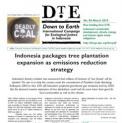- Home
- About
- Campaigns
- Regions
- Themes
- Agrofuels
- Climate justice
- Coastal communities and fisheries
- Disasters
- Economy & debt
- Energy
- Foreign investment
- Forests & forest fires
- Human rights
- Indigenous Peoples
- International Financial Institutions
- Land and food security
- Laws & regulations
- Mining, oil & gas
- Plantations
- Politics & democracy
- REDD
- Regional autonomy
- Transmigration
- Water and dams
- Women
- Publications
- Links
- Contact
Campaign
- Climate Justice and sustainable livelihoods (50)
- MIFEE (8)
- Agrofuels and oil palm plantations (35)
- Coal (23)
- BP - Tangguh (17)
Region
- Indonesia (340)
- Sumatra (165)
- Java, Madura & Bali (54)
- NTT & NTB (25)
- Kalimantan (143)
- Sulawesi (83)
- Maluku (15)
- Papua (137)
- Europe/UK (119)
- International (196)
Theme
- Agrofuels (34)
- Climate justice (85)
- Coastal communities and fisheries (57)
- Disasters (29)
- Economy & debt (85)
- Energy (46)
- Foreign investment (191)
- Forests & forest fires (249)
- Human rights (239)
- Indigenous Peoples (265)
- International Financial Institutions (75)
- Land and food security (187)
- Laws & regulations (167)
- Mining, oil & gas (191)
- Plantations (173)
- Politics & democracy (86)
- REDD (34)
- Regional autonomy (73)
- Transmigration (31)
- Water and dams (28)
- Women (46)




